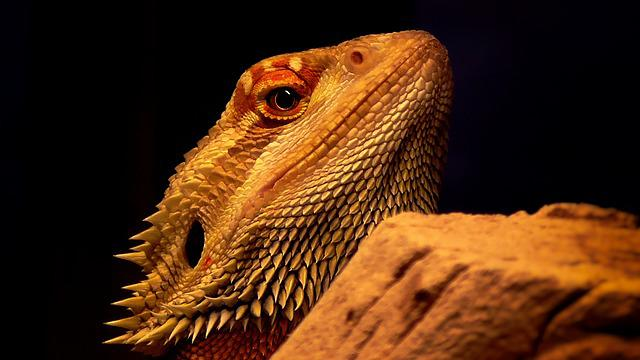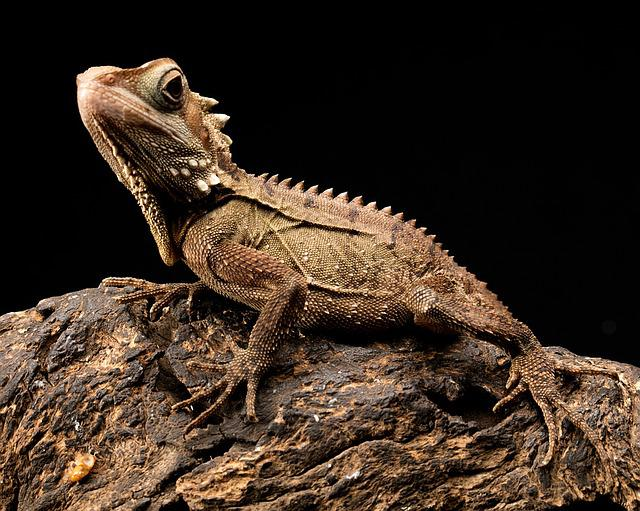Why is my bearded dragon turning black? This is a common question and while this behavior is normal, there may be times when you notice your bearded dragon start to turn black. So why is my bearded dragon turning black? Keep reading to find out!
Why Is My Bearded Dragon Turning Black?

Bearded dragons are known for their ability to change color. They can do this because they have what are called chromatophores in their skin. These are cells that contain pigment and they can expand or contract to show more or less color. It is normal for bearded dragons to change into other colors when they are trying to regulate their body temperature. For example, if a bearded dragon is feeling too warm, it will turn black to absorb more heat from the sun. If a bearded dragon is feeling too cold, it will turn white or yellow to reflect as much heat into its body. In addition, bearded dragons turns black when they are trying to communicate with other beardies. A Blackbeard might be trying to intimidate another dragon, while a light-colored beardie might be trying to appear submissive. Ultimately, there is no right or wrong color for a bearded dragons turns black based on their needs and experiences.
If you’ve ever found your bearded dragon turning black, you’re probably wondering why. There are a few possible explanations for this behavior, and it’s important to understand what might be causing it so you can take appropriate action.
- One possibility is that your bearded dragon is simply experiencing a normal shedding process. Bearded dragons often turns black in color before they shed their skin. If you think this might be the case, you can check for a sign, such as dry skin or loose scales. If your bearded dragon is indeed shedding, there’s no need to worry.
- Another possibility is that your bearded dragon’s dark beard coloration is due to a skin infection. If you notice other signs of illness, such as lethargy, lack of appetite, or discharge from the eyes or nose, then it’s important to take your bearded dragon to the vet right away. Infections can be serious and require treatment with antibiotics.
- It’s also possible that your bearded dragon’s black coloration is simply due to a change in their diet. If you’ve recently introduced any new foods into their diet, this could be the cause. Bearded dragons are known to be fussy eaters, so it’s important to be careful when making any changes to their diet. If you’re not sure what might be causing the color change, it’s always best to consult with a reptile vet.
- Your bearded dragon is stressed. Stress can cause a bearded dragon’s body to produce more melanin, which can make the animal appear darker in color. If you think stress might be the issue, look for a sign such as increased aggression, reduced appetite, or changes in behavior. If you believe your bearded dragon is sick or stressed, try to identify the source of the stress and take steps to reduce it. This may involve making changes to their environment, such as providing more hiding places or increasing the number of times you handle your beardie. Stress can also be caused by changes in their routine, so try to keep things as consistent as possible.
Does A Change In The Skin Colouration Of My Bearded Dragon Indicate Illness?

If your bearded dragon’s skin looks darker than usual, it could be a sign of a health problem. One possibility is that they are shedding their skin. Bearded dragons shed their skin periodically as they grow, and the process can sometimes make your beardie appear dark. If you think your bearded dragon is shedding, look for another sign such as increased scratching or rubbing against surfaces. Shedding usually takes place over several days, so if you see the darkening lasts for more than a day or two, it’s likely, not normal.
Another possibility is that your bearded dragon is experiencing a growth spurt. During a growth spurt, bearded dragon’s beard can sometimes appear darker in color as their bodies adjust to the new size. Growth spurts usually occur during the first year of life, but they can also happen at other times. If you think your bearded dragon is going through a growth spurt, look for other signs such as an increase in appetite or a territorial behavior change.
Do Bearded Dragons Change Colour During Mating Season?
The most common reason is that the dragon is cold and is trying to warm up by basking in the sun. Black male dragons are also more successful at attracting mates, so some males may turn black during the breeding season. If your dragon turns dark and seems stressed or sick, it may be suffering from an infection or illness and should see a veterinarian as soon as possible. In some cases, a bearded dragon turns black beard due to a lack of food or nutrients, so be sure to provide a well-rounded diet and plenty of UV lighting if your pet starts to turning dark.
Whether your bearded dragon is changing color for seasonal or health reasons, it’s important to monitor its behavior and consult with a reptile specialist if you have any concerns. If you’re concerned that your bearded dragon’s is sick, make an appointment with your veterinarian. They can perform a physical examination and run some tests to rule out any underlying health problems. Once a diagnosis has been made, they can provide you with information on how to best care for your bearded dragon.
Do Male Bearded Dragons Change Colour?
If you’re wondering whether male bearded dragons change color, the answer is yes! Males tend to be more colorful than females, and their colors can vary depending on their mood and health. Here’s what you need to know about this fascinating behavior.
Bearded dragons rely on thermoregulation to regulate their body temperature. They do this by changing the color of their skin. When it’s hot, they will darken to absorb more heat, and when it’s cold, they will lighten their skin to reflect high heat. This helps in temperature regulation.
Male bearded dragons are more likely to show off their colors than any female beardie. This is because they use color to communicate with other bearded dragons. For example, two males competing will often darken their skin during mating season when they are trying to impress a female bearded dragon. They will also lighten their skin when they are feeling threatened or aggressive. By changing their colors, male bearded dragons can let other dragons know what they’re thinking and feeling.
Conclusion
There are a few explanations for your bearded dragon’s black colour. If your bearded dragon is basking in too much heat, this can cause black beard. If your bearded dragon is not getting enough UVB light, this can also lead to darker colors. Lastly, if your bearded dragon is stressed, this can also cause its skin to turn black. If you think your bearded dragon is turning black beard for any of these reasons, it’s important to take action quickly and consult with a vet for medical attention.
